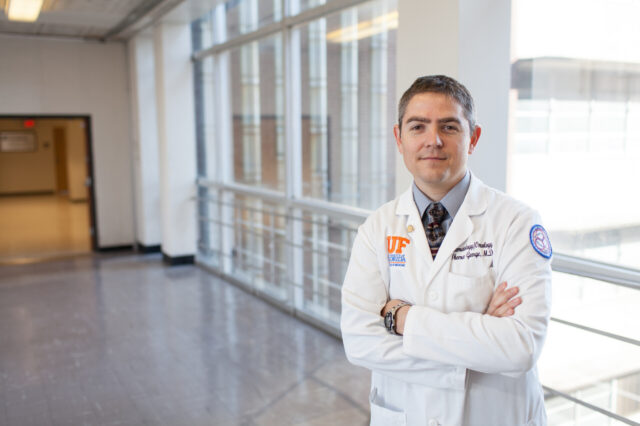UF Health Cancer Center selected for “unprecedented” national pancreatic cancer clinical trial

The University of Florida Health Cancer Center has been selected as one of 12 initial clinical trial sites participating in Precision Promise, the first large-scale precision medicine trial designed to transform outcomes for patients with pancreatic cancer. An initiative of the national nonprofit organization Pancreatic Cancer Action Network, Precision Promise was announced Oct 4.
Bringing together clinicians, researchers, and diagnostic and drug developers, Precision Promise will advance the Pancreatic Cancer Action Network’s goal to double survival rates by 2020, according to the organization’s website.
“Being an inaugural member of the Precision Promise clinical trial consortium ensures that our patients have access to some of the most cutting-edge and innovative therapies available in the world for pancreatic cancer,” said Thomas George, M.D., principal investigator at UF and medical director of the GI Oncology Program. “The tools to help our patients fight pancreatic cancer and advance the field are now at our ready.”
Pancreatic cancer is the third-leading cause of cancer-related death in the United States and is anticipated to become the second around 2020. The disease kills more people than breast cancer and has a five-year survival rate of just 8 percent. Nationally, only 4 percent of pancreatic cancer patients enroll in clinical trials.
“Precision Promise will dramatically accelerate the clinical trial process to bring promising therapies to patients faster,” said Julie Fleshman, J.D., president and CEO of the Pancreatic Cancer Action Network, in a statement. “Precision Promise is an unprecedented opportunity for patients and is vital to move the field forward. Instead of looking for the right patient for a clinical trial, we are designing the right clinical trial for each patient.”
To change the pancreatic cancer treatment paradigm, Precision Promise will investigate multiple treatment options, called substudies, under one clinical trial design that uses an individualized treatment approach based on the molecular profile of a patient and his or her tumor. The substudies are designed so that patients can shift to another option quickly without wasting time between clinical trials.
The system will constantly evolve the treatment options by integrating current research and the most up-to-date science and knowledge available. Substudies can be added for newly discovered biomarkers and treatment approaches, so the field can learn which patients will most benefit from these new developments, and get new, effective treatments to patients sooner.
Starting in the spring of 2017, participating patients will enroll in Precision Promise at local Clinical Trial Consortium sites, including the UF Health Cancer Center. Patients will undergo advanced molecular profiling to determine their tumor’s unique molecular features so they can be paired with the substudy that best matches their individual needs. Once they begin receiving treatment, patients will be monitored closely and follow-up analyses will be conducted to help researchers quickly assess the effectiveness of each treatment in real time.
Currently, important genetic data and clinical trial results are fragmented across various institutions and drug developers, and some important results may never be shared publicly for researchers to learn from these findings.
Through Precision Promise, all data from the initial 12 clinical trial consortium sites will be analyzed together so scientific findings are gathered and disseminated to the research community in a timely manner.
“I am delighted that the UF Health Cancer Center was chosen as one of the 12 national sites for this clinical trial,” said Jonathan Licht, M.D., director of the UF Health Cancer Center. “Pancreatic cancer remains one of the most challenging malignancies facing Americans today. This initiative uses the most up-to-date methods to classify tumors and direct patients toward treatments that may be the best match for their particular tumor. This type of effort represents cancer care of the future and I am proud that UF is taking a leadership role in the effort in the Southeast.”
The Precision Promise infrastructure is uniquely collaborative and cooperative. Led by the Pancreatic Cancer Action Network and an executive committee co-chaired by Andrew Biankin, Ph.D., of the University of Glasgow, and Diane Simeone, M.D., of the University of Michigan, it features working groups of leading experts and diagnostic and drug developers, all of whom are providing expertise and guidance. Supporting the effort are initial members of the Industry Working Group, Promise Patrons Halozyme Therapeutics, Merrimack Pharmaceuticals, Tempus, and Trovagene Inc.
About the author
